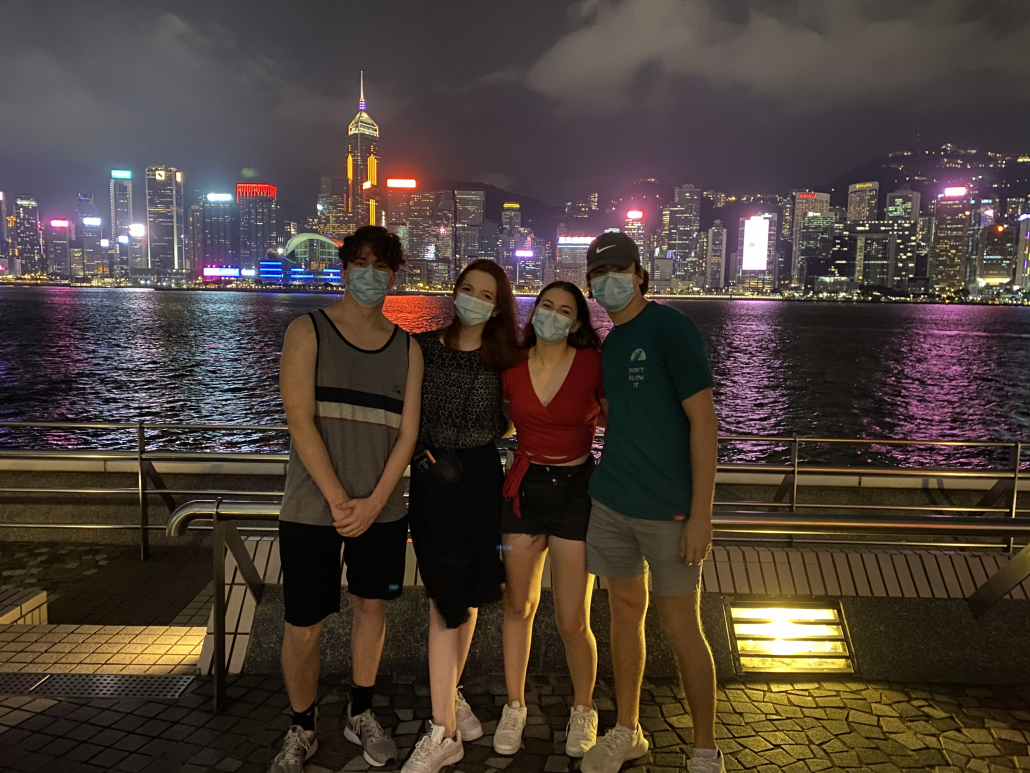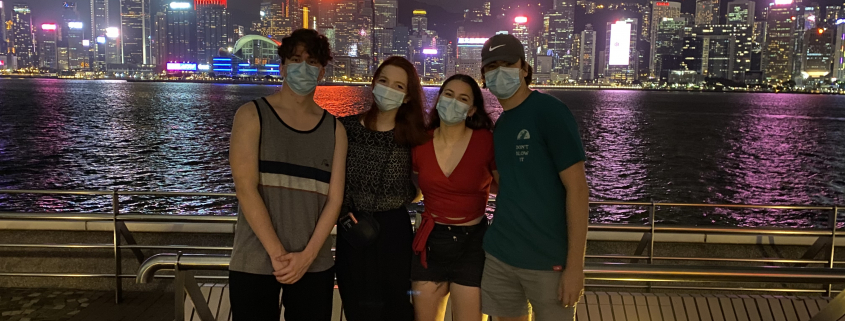World Bachelor in Business students navigate in-person semester abroad

Alex Eaton is part of a handful of USC students who have been taking in-person classes all semester. But Eaton, a sophomore in the World Bachelor of Business program, isn’t in Los Angeles. The program allows students to study on three different campuses and earn three different degrees, and with some reports recording as low as five new positive coronavirus cases per day in Hong Kong, Eaton and some of his classmates headed there to begin their second year in person.
Some students have been able to take in person or hybrid classes at Hong Kong University of Science and Technology and at Bocconi University, Italy. However, others in the program have remained online instead of being at USC, where they had hoped to initiate their educational journey around the world. First year students have their first year at USC, second year in Hong Kong, third year in Milan and can spend their fourth year at one of the three universities of their choice.
Eaton was among the students who were able to start optional in-person classes in Hong Kong. He said he was initially concerned he might not be able to reach Hong Kong because of strict coronavirus regulations. With the United States being categorized as a high-risk country, his cohort was only allowed to enter because they were enrolled as full-time students at HKUST.
The travel process involved a number of precautionary steps to mitigate a potential coronavirus spread. Eaton first flew from his home in Atlanta to L.A. to get tested at USC at the start of the semester to prove he was negative for the virus at least 72 hours before his flight to Hong Kong. Once Eaton arrived in Hong Kong, he waited 14 hours for another test and when it came back negative, he was transported to a hotel for a two-week quarantine.
“They literally put a bracelet on our wrist to make sure that we weren’t leaving the hotel room,” Eaton said. “We literally could have no contact with anyone like physical contact, doors closed all the time, they dropped food off three times a day, we didn’t get a choice what we ate.”
Once his quarantine was completed, Eaton was allowed to venture into the city. He said Hong Kong was highly regulated with gatherings limited to four people and mask wearing strictly enforced. While initially nervous about exploring the city, Eaton has now had the chance to visit many parts of the city without having to worry about crowds or tourists.
HKUST has also given students flexibility to take either in-person or online classes with many students opting for online classes while living in Hong Kong. Eaton has been regularly attending in-person classes as long as capacity has not been reached. Masks are required during lectures, and socially distanced seats or plexiglass dividers are used to separate students in the classroom.
“I think the hybrid’s just strange because you have the people on Zoom at the same time, it’s like the participation between Zoom and in class is just something different to adjust to,” Eaton said. “In one of my classes we have a robot where the teacher has some sort of remote on him and the camera will swivel and follow him as he moves. So the online people kind of still get the same experience of being in the classroom.”
Olamide Babayeju, a freshman in WBB, expected to spend time traveling and learning about other cultures throughout her college experience in the program, but the coronavirus pandemic has halted some of those plans for her and her classmates. Babayeju started her college career online because USC moved online this semester. She decided to pursue the World Bachelor in Business because she spent her time watching travel videos on YouTube and was interested in learning about other people’s cultures as well as business practices.
Although she is disappointed that she started online, Babayeju is grateful for the support offered by her peers in her cohort as well as from upperclassmen.
“Luckily, since WBB is like a small program it’s like 40-50 kids, then we all have a group chat and we’re our own community and that’s great because they know what we’re going through, they know what I’m going through, we’re taking like similar classes,” Babayeju said. “So to have someone in that way it’s really nice. I think in the beginning, it was hard to deal with because you never anticipate this, you plan 18 years like, ‘Oh, I’m gonna go to college … I’m going to live my best life,’ and then [the] corona[virus], and you can’t do that.”
Kaela Gallagher, a junior in the program, has been attending hybrid classes in Milan and is living on campus like most students at Bocconi. When Gallagher first arrived in Milan last month, the university was operating smoothly with students attending classes every other week to lower the amount of students present in each class.
Last week, Gallagher only had one midterm and used her free time to travel around Italy. She visited four different cities and took an empty train around the country. With Italy usually being a tourist hub, seeing the cities so empty made Gallagher feel like she had them to herself.
However, a few days ago Bocconi announced that it was moving courses fully online for the two weeks due to the rise of coronavirus cases in Milan. As of Nov. 3, the daily average of confirmed cases within the past seven days was over 3,100 in Milan, according to the New York Times. Gallagher said she is waiting to see what happens and hoping for the best.
“[There’s] a lot of different powers involved and as far as coronavirus goes we really are at the mercy of the country we’re living in and whatever the university there decides to do,” Gallagher said. “WBB is just a small part of each of these universities so we really just have to go with the flow.”
Kristen Gao, a senior in the program, had to return to the United States while studying in Milan last spring. Gao said that the panic started at the end of February when news broke out that two people in a nearby town had tested positive. Soon after, USC called back all study abroad students to the United States and although Gao was not considered a study abroad student, her mother urged her to fly back to the U.S.
“I was kind of hesitant to fly back because by that Friday after things had more or less returned to normal,” Gao said. “I remember when I took the taxi to the airport the buses were completely packed as if things were totally normal, although a few days before [they] were empty because people panicked about the virus. So yeah, there was that and then I flew back on Saturday. A few days after [I left], Milan had totally shut down so [I] actually made a good call.”
Like most seniors in WBB, Gao returned to USC for her last year, but because of the pandemic, many of her classmates returned to Hong Kong so they could continue in-person classes and have a somewhat normal college experience. Despite the semester going online, Gao remained at USC because of her interest in pursuing a career in real estate and the ability to remain local rather than having to travel to Hong Kong.
Gao is enjoying being able to take USC classes again and said that despite the coronavirus, she has had an overall positive experience through WBB. However, transitioning back to USC in an online environment has had its shortcomings.
“I think the interesting thing about it being online is that I see a lot of familiar faces in my business classes, but it’s not like I can go walk up to them after class and catch up with them. I really just keep in my classes and kind of remember speaking to them freshman year,” Gao said. “I think we do lose a lot just because you’re at USC as a freshman [and] when you’re a sophomore you’re not there so we don’t really know any underclassmen aside from the ones in our program.”

